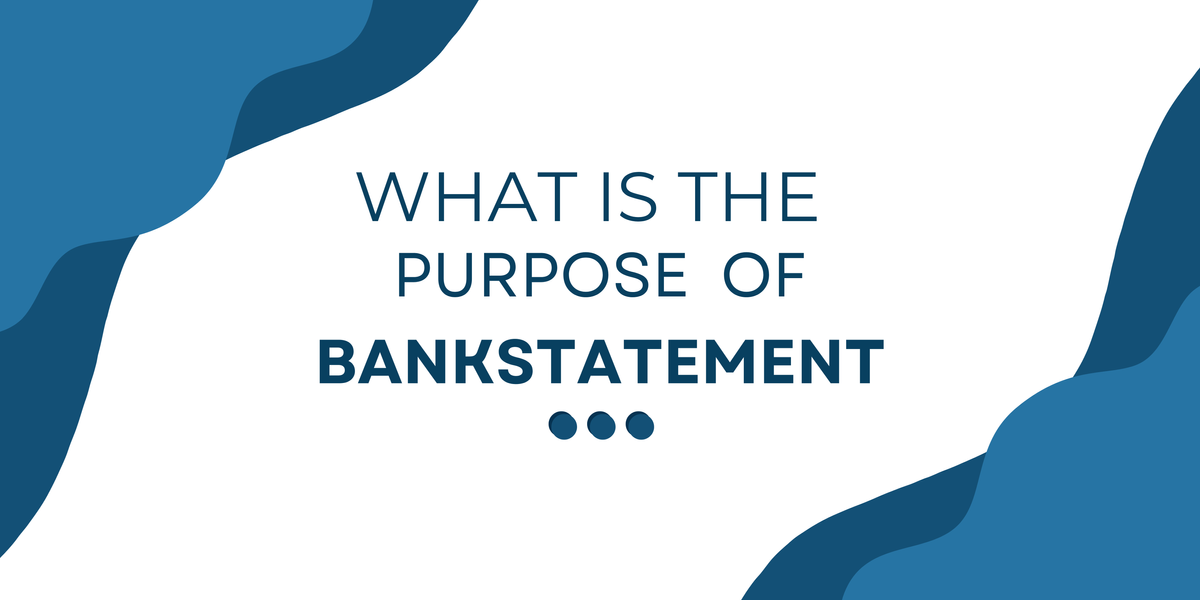Your bank statement isn’t just a monthly report—it’s a detailed map of your financial journey. Beyond listing transactions, it reveals patterns in your spending, highlights opportunities to save, and ensures your financial records stay accurate.
In this article, we’ll dive into why bank statements matter, the value they offer, and how you can use them to confidently manage your finances.
The Purpose of a Bank Statement
A bank statement serves as more than just a summary of transactions—it’s a cornerstone of financial management. Here’s how it supports your financial goals:
Tracking Financial Transactions
Your bank statement provides a clear picture of your income, expenses, and spending habits. By reviewing it regularly, you can pinpoint where your money goes and identify trends in your financial behavior.
Verification of Records
Comparing your personal or business records with your bank statement ensures accuracy and helps catch any errors or discrepancies early. This verification process keeps your financial records in check and prevents costly mistakes.
Budgeting and Financial Planning
A bank statement is an invaluable tool for creating realistic budgets and managing cash flow. By analyzing past spending patterns, you can al locate funds effectively and set achievable financial goals.
Fraud Detection and Dispute Resolution
Regularly reviewing your bank statement allows you to quickly spot unauthorized transactions or bank errors. Prompt detection ensures you can resolve issues swiftly and protect your finances from potential fraud.
Legal and Documentation Needs
Whether it’s for filing taxes, applying for loans, or handling legal disputes, your bank statement serves as official proof of financial transactions. It’s a reliable document that adds credibility and accuracy when needed.
What is a Bank Statement?
A bank statement is a detailed summary of your financial activity over a specific period, typically one month. It provides a clear record of every transaction, showing exactly how money flows in and out of your account.
Think of it as your financial report card, offering a snapshot of your income, expenses, and overall account health.
Key Components of a Bank Statement
Here are the key features of a Bank Statement that you need to know about:
Transaction Details:
Every deposit, withdrawal, and payment is listed with details such as dates, descriptions, and amounts.
For example, you might see entries for a paycheck deposit, an online subscription payment, or a grocery store purchase.
Balances:
- Opening Balance: The amount in your account at the start of the statement period.
- Closing Balance: The final amount after all transactions are accounted for.
- Daily Balances: A breakdown of how your balance changes day-to-day.
- Fees and Interest: Any charges, such as maintenance fees or overdraft penalties, are clearly noted. If your account earns interest, the amount accrued during the period is also included.
Example:
Imagine your monthly statement shows the following:
- A salary deposit of $3,000.
- A grocery shopping expense of $150.
- A $10 monthly maintenance fee charged by the bank.
With these details, you gain an accurate understanding of where your money came from, how it was spent, and what’s left at the end of the month.
Why You May Need to Convert Bank Statements from PDF to Excel
While PDF bank statements are excellent for recordkeeping, they can be limiting when it comes to deeper analysis or data organization.
Converting your bank statement into an Excel or CSV format can unlock new levels of efficiency and flexibility, making financial management simpler and more effective.
Why Conversion is Important
PDF files are static and harder to manipulate, whereas Excel allows you to sort, filter, and calculate data quickly. Whether you’re reviewing spending patterns, preparing a report, or reconciling accounts, working in a spreadsheet format streamlines the process and saves time.
When Conversion is Most Useful
For Businesses: Businesses often need to manage cash flow, prepare financial reports, and analyze transaction trends.
Converting statements to Excel allows for easy categorization of expenses, comparison of monthly data, and more accurate financial projections.
For Individuals: Individuals looking to track their expenses, create budgets, or monitor spending habits can benefit greatly from the flexibility Excel provides.
Sorting and filtering transactions by category or date becomes much easier in a spreadsheet.
During Tax Preparation: Tax season requires a detailed breakdown of income and expenses. Having your bank statement data in Excel simplifies organizing and calculating deductible expenses, making the process more efficient and error-free.
Benefits of Bank Statements
Bank statements serve as powerful tools for both individuals and businesses, offering clear advantages tailored to their unique needs.
From tracking expenses to supporting audits, these documents provide the financial clarity necessary for effective management.
For Individuals:
Here’s how bank statements can help you take control of your personal finances:
- Track Expenses and Create Budgets: A bank statement helps you see exactly where your money is going. By reviewing your spending habits, you can identify areas to cut back and allocate funds more effectively.
- Detect Fraudulent Charges: Regularly checking your statement allows you to quickly spot unauthorized transactions or errors, ensuring your financial security.
- Monitor Savings Progress: Keep track of how much you’re saving each month and adjust your goals as needed. Your statement provides a clear snapshot of your financial growth.
- Plan for Long-Term Goals: Whether you’re saving for a vacation, a home, or retirement, bank statements help you evaluate your progress and refine your strategy.
For Businesses:
Here’s why bank statements are essential for keeping your business finances on track:
- Manage Cash Flow: Businesses rely on consistent cash flow to operate efficiently. Bank statements provide a clear view of incoming and outgoing funds, enabling better financial planning.
- Verify Vendor and Client Transactions: Ensure all payments to vendors and from clients are accounted for. Bank statements serve as a reliable record for reconciling accounts and resolving discrepancies.
- Support Financial Audits: Bank statements are essential for audits, offering a detailed record of transactions that can validate your financial reports.
- Ensure Regulatory Compliance: Many industries require strict adherence to financial regulations. Bank statements provide the documentation needed to meet these standards and avoid penalties.
Common Challenges with Bank Statements
Bank statements are essential, but they can present certain challenges that make managing finances more complicated. Here are some common obstacles and how to address them effectively:
- Misunderstanding Bank Codes or Transaction Descriptions: Abbreviated or unclear transaction details can create confusion, making it difficult to understand where your money is going.
- Identifying and Reconciling Discrepancies: Outstanding checks, delayed deposits, or errors can cause your personal records to differ from your bank statement, requiring careful reconciliation to resolve.
- Manually Analyzing Large Volumes of Transactions: Reviewing extensive transaction lists can be overwhelming and time-consuming, especially for businesses or during tax preparation.
Solution:
Converting your bank statements to Excel or CSV formats can make these challenges easier to handle. With tools like ConvertMyBankStatement.com, you can sort, filter, and analyze your financial data efficiently, saving time and reducing the risk of errors.
Conclusion
Bank statements are essential tools for tracking spending, verifying records, and planning financial goals. They provide clarity for individuals and businesses alike, helping to manage cash flow and ensure accuracy.
Overcome challenges like reconciling discrepancies or analyzing large data by converting PDF statements to Excel with tools like ConvertMyBankStatement.com. Regularly reviewing your statements empowers you to take control of your finances and stay on track.
FAQS
How Long Should I Keep My Bank Statements?
It’s recommended to keep bank statements for at least one year for general reference. For tax-related documents or business records, consider keeping them for up to seven years in case of audits or disputes.
Can I access bank statements that are older than a year?
Many banks allow access to older statements through their online portals, though availability varies. If you need a statement beyond the available period, you may need to request it from your bank, which could incur a fee.
What Should I Do If I Find an Error on My Bank Statement?
If you notice an error, promptly contact your bank’s customer service. Provide details about the discrepancy and any supporting documents. Most banks have a dispute resolution process to handle such issues efficiently.



Member discussion: